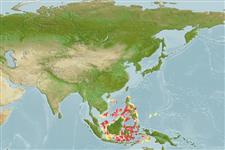>
Ophidiiformes (Cusk eels) >
Dinematichthyidae (Viviparous brotula)
Etymology: Paradiancistrus: Named for its most similar genus, Diancistrus.; cuyoensis: Named for its type locality, Cuyo Islands, NE Palawan, Philippines..
More on authors: Schwarzhans, Møller & Nielsen.
Environment: milieu / climate zone / depth range / distribution range
ນິເວດວິທະຍາ
ສັດທະເລ ກ່ຽວກັນຫີນ; ລະດັບຄວາມເລິກ 0 - 33 m (Ref. 57884). Tropical
Western Pacific: Philippines.
ຂະໜາດ / ນ້ຳໜັກ / Age
Maturity: Lm ? range ? - ? cm
Max length : 3.6 cm SL ຕົວຜູ້/ບໍ່ມີເພດ; (Ref. 57884); 5.7 cm SL (female)
Short description
ຕົວທີ່ໃຊ້ໃນການຈຳແນກຊະນິດ | ສະລີລະວິທະຍາ | ການວັດແທກຮູບຮ່າງລັກສະນະພາຍນອກຂອງດິນ,ສັດ,ປາ…
ຄີຫຼັງຂອງປາ (ຄີອ່ອນ) (ທັງໝົດ) : 76 - 81; ຄີກົ້ນຂອງປາ: 62 - 65; ສັດທີ່ມີກະດູກສັນຫຼັງ: 42 - 43. The species is characterized by the following: vertebrae 11+31-32=42-43, dorsal fin rays 76-81, anal fin rays 62-65; large eyes (2.4-2.5% SL); lower preopercular pores 1; outer pseudoclasper narrow wing-shaped, moderately long; inner pseudoclasper a long thin flap, anteriorly joined to outer pseudoclasper forming a u-shaped structure, with supporter; moderately broad scale patch on cheek with 5-7 scale rows on upper cheek, no scales on operculum; the head profile with a stubby snout (Ref. 57884).
Solitary in reef crevices to 33 m, cryptic (Ref 90102).
Life cycle and mating behavior
Maturities | ການສືບພັນ | Spawnings | Egg(s) | Fecundities | ຕົວອ່ອນ
Schwarzhans, W., P.R. Møller and J.G. Nielsen, 2005. Review of the Dinematichthyini (Teleostei, Bythitidae) of the Indo-West-Pacific. Part I. Diancistrus and two new genera with 26 new species. The Beagle, Records of the Museum and Art Galleries of the Northern Territory 21:73-163. (Ref. 57884)
IUCN Red List Status (Ref. 130435)
Threat to humans
Harmless
Human uses
ການປະມົງ: ທີ່ບໍ່ມີຄວາມສົນໃຈ
ເຄື່ອງມື
Special reports
Download XML
ແຫຼ່ງອີນເຕີເນັດ
Estimates based on models
Preferred temperature (Ref.
123201): 28.4 - 29.3, mean 28.8 °C (based on 364 cells).
Phylogenetic diversity index (Ref.
82804): PD
50 = 0.5625 [Uniqueness, from 0.5 = low to 2.0 = high].
Bayesian length-weight: a=0.00389 (0.00180 - 0.00842), b=3.12 (2.94 - 3.30), in cm total length, based on all LWR estimates for this body shape (Ref.
93245).
ຊັ້ນເຂດຮ້ອນ (Ref.
69278): 3.3 ±0.5 se; based on size and trophs of closest relatives
Fishing Vulnerability (Ref.
59153): Low vulnerability (10 of 100).
